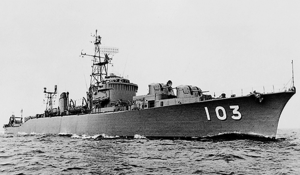Ayanami-class destroyer
 Ayanami class member Ayanami
| |
| Class overview | |
|---|---|
| Name | Ayanami class |
| Operators | |
| Preceded by | Harukaze class |
| Succeeded by | Murasame class |
| Built | 1956–1960 |
| In commission | 1958–1990 |
| Completed | 7 |
| Retired | 7 |
| General characteristics | |
| Type | Destroyer |
| Displacement |
|
| Length | 109 m (358 ft) |
| Beam | 10.7 m (35 ft) |
| Depth | 8.1 m (26 ft 7 in) |
| Complement | 220 |
| Sensors and processing systems | |
| Electronic warfare & decoys | NOLR-1 |
| Armament |
|
The Ayanami class was a destroyer class built for the Japan Maritime Self-Defense Force (JMSDF) in the late 1950s. The primary purpose was anti-submarine warfare, so this class was classified as "DDK" (hunter-killer anti-submarine destroyer) unofficially.[1]
Design
This class adopted a "long forecastle" design with inclined afterdeck called "Holland Slope", named after the scenic sloping street in Nagasaki City.[2] Their steam turbine propulsion systems were similar to the ones of the Harukaze class, but they varied between each ship in the class as part of the JMSDF's attempt to find the best propulsion system for its future surface combatants.[3]
The Ayanami class were the first JMSDF vessels equipped with six 3-inch/50 caliber Mark 22 guns with Mark 33 dual mounts and Mark 32 lightweight torpedoes with two Mark 2 over-the-side launchers.[4] 3-inch guns were controlled by two Mark 63 GFCSs.[5]
All seven vessels names had previously been borne by ships of the World War II-era Fubuki and Yūgumo-class destroyer classes.
| Pennant no. | Name | Builder[6] | Laid down[6] | Launched[6] | Commissioned [6] | Decommissioned[6] |
|---|---|---|---|---|---|---|
| DD-103/ASU-7004 | Ayanami | Mitsubishi Zosen, Nagasaki | 20 November 1956 | 1 June 1957 | 12 February 1958 | 25 December 1986 |
| DD-104/TV-3502 | Isonami | Shin-Mitsubishi, Kobe | 14 December 1956 | 30 September 1957 | 14 March 1958 | 1 July 1987 |
| DD-105/ASU-7005 | Uranami | Kawasaki, Tokyo | 1 February 1957 | 29 August 1957 | 27 February 1958 | 25 December 1986 |
| DD-106/TV-3503 | Shikinami | Mitsui Zosen, Tamano | 14 December 1956 | 25 September 1957 | 15 March 1958 | 1 July 1987 |
| DD-110/ASU-7009 | Takanami | Mitsui Zosen, Tamano | 8 November 1958 | 8 August 1959 | 30 January 1960 | 1 March 1989 |
| DD-111/ASU-7013 | Ōnami or Oonami[7] | Ishikawajima HI, Kobe | 20 March 1959 | 13 February 1960 | 29 August 1960 | 1 March 1990 |
| DD-112/ASU-7014 | Makinami | Iono HI, Maizuru | 20 March 1959 | 25 April 1960 | 28 October 1960 | 1 March 1990 |
Notes
- ^ "History of Japanese destroyers since 1952". Ships of the World (in Japanese) (742). Kaijin-sha: 91–97. June 2011.
- ^ "1. Hull (Hardware of JMSDF destroyers)". Ships of the World (in Japanese) (742). Kaijin-sha: 100–105. June 2011.
- ^ Yasuo Abe (June 2011). "2. Propulsion system (Hardware of JMSDF destroyers)". Ships of the World (in Japanese) (742). Kaijin-sha: 106–111.
- ^ "3. Underwater weapons (Shipboard weapons of JMSDF 1952-2010)". Ships of the World (721). Kaijin-sha: 94–99. March 2010.
- ^ "2. Guns (Shipboard weapons of JMSDF 1952-2010)". Ships of the World (721). Kaijin-sha: 88–93. March 2010.
- ^ a b c d e Gardiner and Chumbley 1995, p. 223.
- ^ Sometimes Oonami depending on romanization
References
- Gardiner, Robert; Chumbley, Stephen (1995). Conway's All The World's Fighting Ships 1947–1995. Annapolis, Maryland, USA: Naval Institute Press. ISBN 1-55750-132-7.
